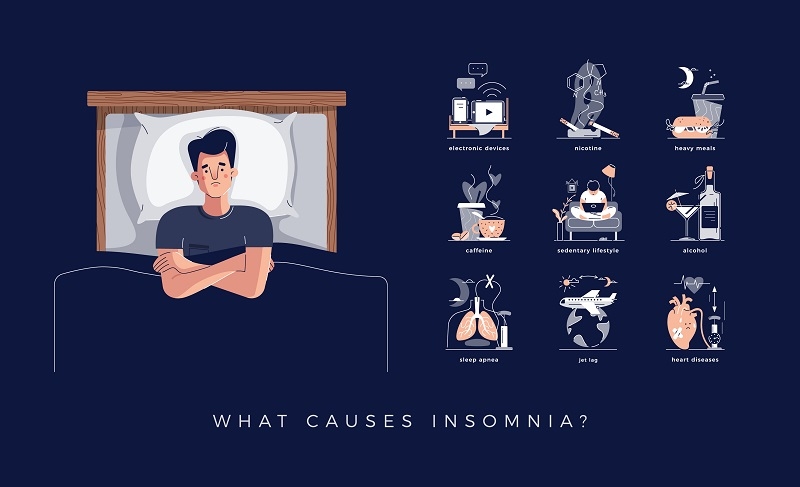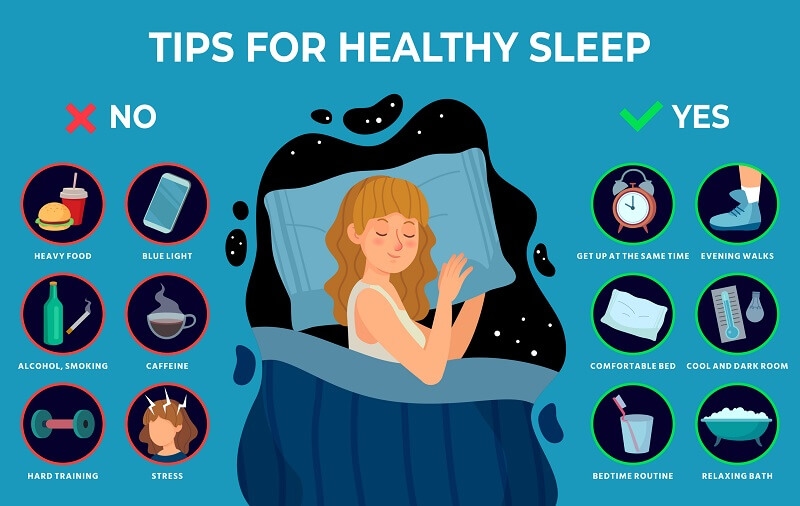Insomnia Disorder Uncovered: Causes, Symptoms, and Solutions

In a world that never sleeps, achieving a restful night's slumber can feel like a precious oasis in a desert of demands and distractions. Yet, for many, insomnia becomes an unwelcome companion, casting shadows over peaceful nights and disrupting daily life. Our journey is one of discovery, leading you towards a deeper understanding of this elusive sleep disorder and, more importantly, providing you with the tools to conquer it and experience the rejuvenating embrace of sound sleep.
What is Insomnia?
Insomnia is a complex sleep disorder identified by persistent difficulty falling asleep, staying asleep, or experiencing non-refreshing, poor-quality sleep. This common ailment can lead to various issues, including fatigue, irritability, impaired cognitive function, and a marked decline in overall quality of life.
Types of Insomnia
Insomnia manifests in two primary forms:
- Acute Insomnia: This type is typically short-term and often stems from specific life events or stressors. Acute insomnia often resolves itself without specific treatment as the underlying causes fade.
- Chronic Insomnia: In contrast, chronic insomnia persists for at least three nights a week for three months or longer. It may have various underlying causes and can be more challenging to treat, necessitating a more in-depth approach.
What are the Symptoms of Insomnia?
The symptoms of insomnia can manifest in various ways, with individuals experiencing one or more of the following:
- Difficulty falling asleep, even when tired.
- Frequent awakenings during the night lead to fragmented sleep.
- Waking up too early in the morning and struggling to fall back asleep.
- Sleep that feels non-refreshing, leading to persistent daytime fatigue.
- Daytime sleepiness and a general sense of lethargy.
- Mood disturbances, such as irritability and mood swings.
- Difficulty concentrating, affecting work, studies, and daily activities.
What are the Causes of Insomnia?

Insomnia can be triggered by a multitude of causes, which include:
- Stress: High-stress levels can lead to racing thoughts and increased physiological arousal, making it challenging to relax and fall asleep.
- Medical Conditions: Certain medical issues, like asthma, chronic pain, heartburn, and other ailments, can disrupt sleep patterns and result in insomnia.
- Medications: Certain medications, including stimulants and some antidepressants, can interfere with sleep quality and duration.
- Psychological Disorders: Mental health issues like anxiety, depression, and other mood disorders can significantly contribute to insomnia.
- Poor Sleep Hygiene: Bad sleep habits, such as irregular sleep schedules and excessive use of electronic devices before bedtime, can exacerbate insomnia.
What are the Risk Factors for Insomnia?
Various factors can increase the likelihood of developing insomnia, including:
- Age: Insomnia becomes more common, with older adults often experiencing sleep disturbances.
- Gender: Women are more prone to insomnia than men.
- Stressful Life Events: Major life changes, work-related stress, or personal crises can trigger acute insomnia.
- Shift Work: Irregular working hours can disrupt the body's natural sleep-wake cycle, leading to insomnia.
- Family History: A family history of insomnia can suggest a genetic predisposition to the disorder.
- Substance Abuse: Substances like alcohol, caffeine, or nicotine, particularly close to bedtime, can interfere with sleep.
- Mental Health Disorders: Conditions like anxiety and depression are closely associated with insomnia.
How Do Sleep Habits Contribute to Insomnia?
The development and persistence of insomnia are often linked to poor sleep hygiene, encompassing various negative sleep-related behaviors. Some common contributors include:
- Inconsistent Sleep Schedules: Going to bed and waking up at different times each day can disrupt the body's internal clock, making it harder to fall asleep.
- Excessive Daytime Napping: Extended naps during the day can reduce the body's sleep drive, making it difficult to fall asleep at night.
- Overuse of Electronic Devices: The blue light emitted by smartphones, tablets, and computers interferes with melatonin production, essential for sleep regulation.
- Late-night caffeine or Alcohol Consumption: These substances can disrupt sleep cycles and lead to frequent awakenings.
- Uncomfortable Sleep Environment: An uncomfortable mattress or excessive noise and light in the bedroom can hinder quality sleep.
How is Insomnia Diagnosed?
To diagnose insomnia, healthcare professionals employ a combination of methods, including:
- Medical History: A comprehensive medical history is taken to identify any underlying medical conditions, medications, or psychological factors contributing to insomnia.
- Sleep Diary: Keeping a sleep diary can help track sleep patterns and identify potential triggers for insomnia.
- Polysomnography: In some cases, a sleep study, known as polysomnography, rule out other sleep disorders, such as sleep apnea or restless leg syndrome.
How is Insomnia Treated?
The treatment of insomnia is multi-faceted and can be tailored to an individual's specific needs. Some of the critical treatment options include:
- Lifestyle Modifications: Implementing healthy sleep habits is often the first line of defense. These include establishing a consistent sleep schedule, creating a calming bedtime routine, and reducing the use of stimulants close to bedtime.
- Cognitive-Behavioral Therapy (CBT): Cognitive-Behavioral Therapy for Insomnia (CBT-I) is considered one of the most effective treatments for chronic insomnia. CBT-I helps individuals change thought patterns and behaviors that hinder sleep, leading to better sleep quality.
- Medications: In certain situations, healthcare providers may prescribe medications for short-term use to address sleep issues. However, these are typically not recommended for long-term use due to the potential for side effects and dependency.
How to Prevent Insomnia

Although it may not always be possible to prevent insomnia entirely, you can significantly reduce your risk by following these strategies:
- Maintain a Consistent Sleep Schedule: Going to bed and waking up at the same time daily regulates your body's internal clock, making it easier to fall asleep at night.
- Create a Relaxing Bedtime Routine: Calming activities before bed, such as reading or taking a warm bath, can signal your body that it's time to wind down.
- Limit Caffeine and Alcohol Intake: Reduce your consumption of caffeine and alcohol, especially in the evening, to minimize sleep disruption.
- Stay Physically Active: Regular exercise can promote better sleep, but avoid vigorous workouts close to bedtime.
- Manage Stress: Practice relaxation techniques like meditation, deep breathing exercises, or yoga to alleviate stress and anxiety, which can interfere with sleep.
- Avoid Heavy Meals: Heavy meals before bedtime can lead to discomfort and digestive issues that disrupt sleep.
- Optimize Your Sleep Environment: Make sure your bedroom is conducive to sleep by keeping it cool, dark, and quiet. Invest in a comfortable mattress and pillows.
Conclusion
Conquering insomnia is not only possible but crucial for overall well-being. Armed with a thorough understanding of the causes, symptoms, and risk factors associated with insomnia, as well as the knowledge of how to cultivate healthy sleep habits, individuals can make profound changes in their sleep patterns. Seeking professional guidance for diagnosis and treatment is essential, as it can lead to customized strategies for improving sleep quality. By implementing these approaches and embracing a proactive attitude towards sleep, you can unlock the door to a healthier, more restful life enriched by the countless benefits of rejuvenating rest.
This content was created by AI
-1717753922-r.jpg)